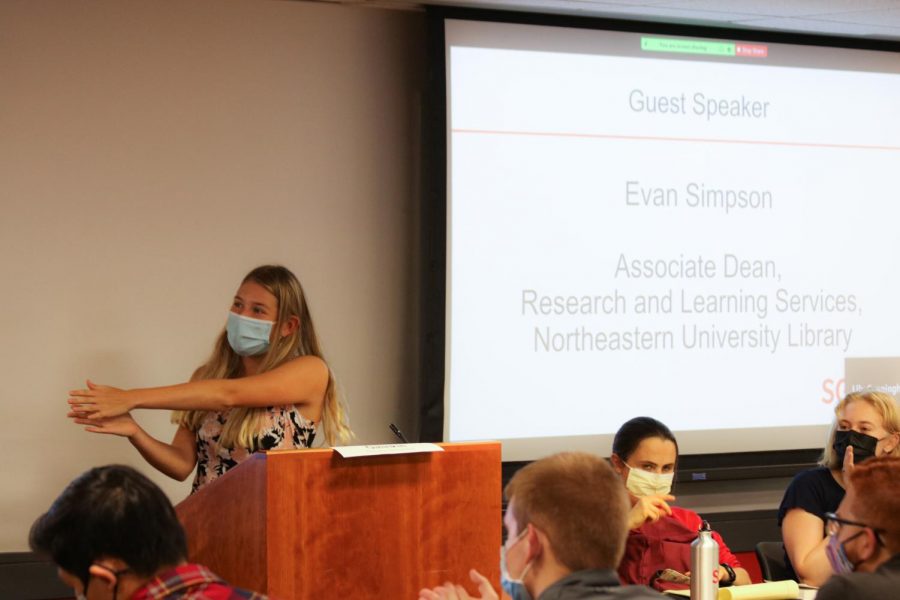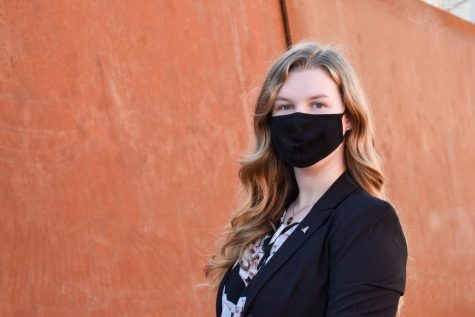What is the Student Government Association? SGA officials explain group, promise transparency
Student Government Association senate meetings are open to everyone, and students do not have to be an elected senator to particpate in committee projects.
September 30, 2021
From the outside, the Student Government Association at Northeastern may seem to be an amorphous group of students with a confusing internal structure, but Nicole Miranda, a fifth-year health science major and parliamentarian for student government, said the group acts as a liaison between the student body and the administration. Student Government Association, or SGA, takes what the students want to see changed on campus and brings it to the attention of relevant parties.
“A lot of the work we do is able to get right on to [President Joseph E.] Aoun’s desk,” Miranda said. “We are able to take the opinions of the student body and really present that to the administration and hopefully get some work done based on what the student body wants or needs.”
SGA is made up of several different bodies: e-board, cabinet, other leadership, senate, committees and boards. The Senate, the largest congregation, is composed of student senators, who represent specific groups on campus.
Many senators serve on various committees and boards responsible for separate areas like finance, elections, sustainability and academic affairs. Committees and boards work on projects that could directly affect student life. Anyone is able to join a committee or board by contacting the vice president in charge and explaining their interest.
There is also the e-board which is composed of the president, executive vice president and all other vice presidents. The cabinet, which includes all of e-board along with two executive directors and the chief of staff, acts as a liaison between SGA and the Northeastern administration.
SGA president Casey Buttke, a fourth-year political science and criminal justice combined major, said SGA functions as a bridge between the students and the administration; students often organize through petitions and Buttke said SGA can help the petitions reach the right people at Northeastern.
“I have also encouraged all of our leadership and all of our senators this year to, if they see a petition or a post or even just someone posting something on Instagram, to send it into our group Slack and let’s talk about it, let’s figure out how to help that person,” Buttke said. “We really try to keep our eyes open for students who aren’t reaching out to us directly but who we think we can help.”
Miranda encouraged students to attend senate meetings, which are open to anyone, read the meeting minutes or reach out to SGA leadership. SGA has moved to a hybrid model with in-person attendance encouraged but an online option for those in wellness housing or not in Boston.
Matt Coleman, a second-year business administration and psychology combined major, is a senator from the D’Amore-McKim School of Business. He joined SGA last year and said the transition to in-person senate has been very smooth.
“[SGA] is an organization that enables student senators to advocate on behalf of a certain group of people or advocate on behalf of their own beliefs in this body that actually has an impact on administrative decisions from time to time,” Coleman said.
The direct impacts students can see from SGA’s work come mainly from projects and initiatives the organization is able to take to Northeastern’s administration, Buttke said. Some projects from recent years include campaigning to get compost bins in dining halls and moving to get emergency numbers on the back of Husky cards.
“In terms of COVID, we campaigned that first spring to have the Pass/Fail option available for students,” Buttke said. “The administration was originally pushing back a lot on us and then we really turned to the students and we said, ‘Here are ways that you guys can voice your support for this,’ and people came out in droves really supporting it.”
[SGA] is an organization that enables student senators to advocate on behalf of a certain group of people or advocate on behalf of their own beliefs in this body that actually has an impact on administrative decisions from time to time.
— Matt Coleman
Some current projects SGA is tackling include initiatives surrounding mental health and sustainability, and plans for a syllabi database and textbook exchange program.
Buttke emphasized that students don’t have to be a senator to join committee projects they are passionate about — projects are open to all students.
“I’ve really been encouraging our leadership team to delegate more and have more project leads and make sure that more freshmen feel empowered to lead their own projects and lead their own initiatives,” Buttke said.
She went on to mention the importance of having a diverse team working on each project, with students from different backgrounds.
“We actually actively encourage that there be students at large who are on our committees because otherwise we only have the perspective of someone who is otherwise involved in SGA, and it can be incredibly helpful to have people who just aren’t,” Buttke said. “Having them be able to come and participate in these discussions and join in on these committees and really help with our advocacy makes a huge difference.”
Buttke, who ran on a joint slate with Izzy Galinkin last year, won the student body vote with 86% support. Currently, Buttke is involved with initiatives surrounding mental health and changes to the dining system at Northeastern.
“I have been Chief of Staff for two years, which has meant that I have been very much on the administrative side of SGA, and one of the reasons I ran for president was because I was really excited to get back into working on tangible advocacy,” Buttke said.
When asked about her goals for SGA this year, Buttke said she wants to increase the proactiveness of members in leadership positions. Buttke said she makes a habit of reaching out to students on social media if she sees them advocating for a cause, and she encourages students to reach out to SGA if they have anything they want to see changed.
If students want to go beyond joining a committee or casually working with SGA, the next level of involvement is as a senator. To become senator, students must receive 30 signatures from peers in their academic college or club on campus.
“If you have a specific niche that you want to get into we have a variety of projects posted on our project board, and it’s pretty non-committal because to get involved in those projects you don’t have to be a senator,” Coleman said.
For more information about SGA, Miranda said students can follow SGA on social media.
“The best part is that there’s literally no barrier to entry. Anyone is able to join the Senate, which is why I think it’s such a diverse group of people that come in. You are not running against other people to become a senator,” Miranda said.
Buttke and Miranda both emphasized that this year SGA wants to be transparent and more connected with the student body than in years past.
“We’re really accessible — just communicate with us,” Miranda said. “We’re only going to be able to do as much as people tell us that we should do. We can generate as many projects as we want but we want to hear what would work best for our student body.”




















